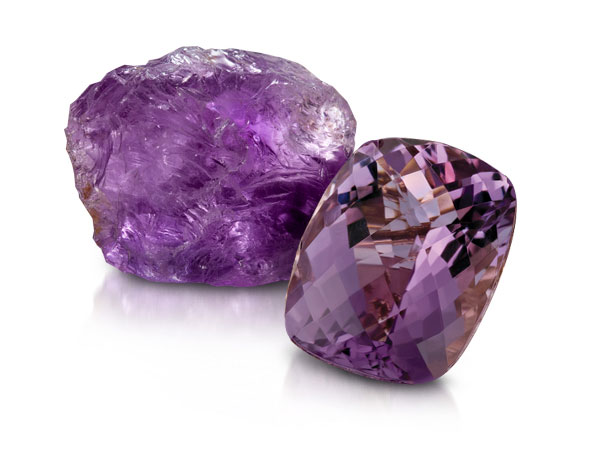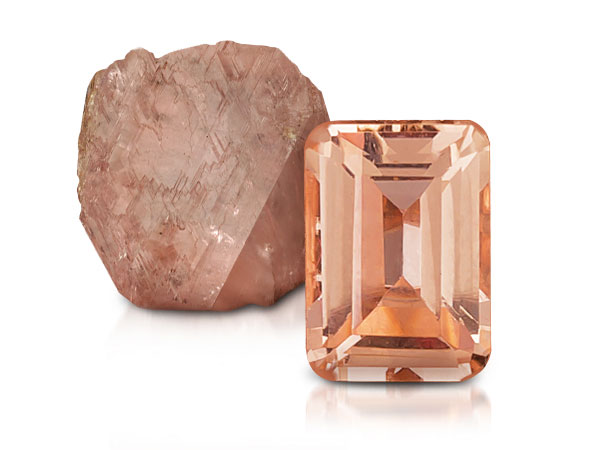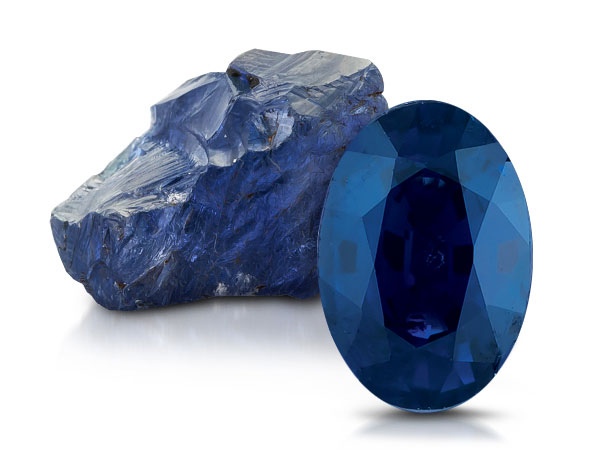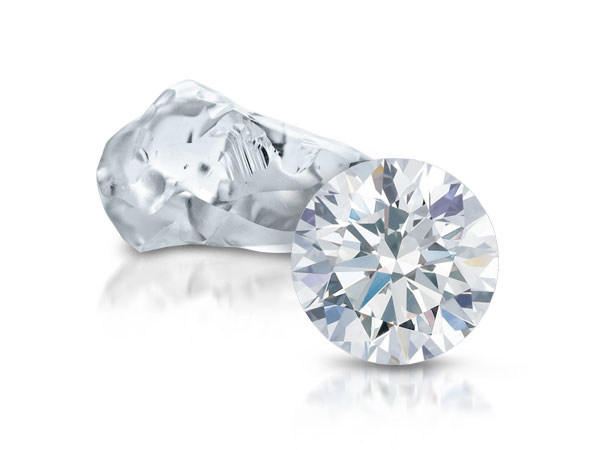Grape Amethyst™
Amethyst is one of the most popular and mystical gemstones: worn by the ancient Romans as a talisman; written about by Leonardo da Vinci who said the gem had the power to protect against evil thoughts and sharpen intelligence; and to this day, amethysts are featured in the Tibetan rosary as the Buddhists believe the gem enhances the peace and tranquility of meditation.
Amethysts come in a variety of shades and colors, from pink to the deepest royal purple which is the sweet flavor of Le Vian®'s Candy Colors® Amethyst. Brazil and Zambia are the major producers of gem quality amethyst.
Very large sizes of rich, deep color amethyst are very rare. An amethyst which weighs more than 1,000 carats can be seen The Smithsonian Institution, whose gem gallery is home to some of the most famous Amethyst gems in the world dating back to the early 1900's. Other famous amethysts housed at The Smithsonian include: the 96-carat heart-shaped Morris Amethyst brooch; a 56-carat square, cushion-cut amethyst necklace that displays a deep purple color with flashes of red.

CINNAMON CITRINE®
The name citrine comes from the French word "Citron" meaning lemon, its color ranging from a juicy lemon yellow to orange brownish orange. This popular neutral gem is the most affordable of the earth-toned gemstones and pairs perfectly with Le Vian® Honey GoldTM.
In ancient times, citrine was worn to deter from snakebites and the even more powerful venom of evil words and thoughts. This gem garnered a big following in the 40s in retro jewelry, with its sun kissed color and large stones brilliantly set against the bold gold of the era. Joan Crawford was often seen wearing an emerald-cut citrine ring that was more than 100 carats!
Pomegranate GarnetTM
Garnet Family | Mohs Scale: 7.5-8 | January Birthstone | 2nd Anniversary Gemstone
"Pomegranate Garnet offers January babies a garnet with warmer chocolate undertones that are perfectly complemented by Chocolate Diamonds®."
The history of garnets can be traced back to 3100 B.C., the original red garnet gem adorning the necklaces of Egypt’s pharaohs and the signet rings of ancient Rome. Garnets were named by the ancient Greeks for its color which resembled pomegranate seed - granatum. In legend, the garnet was believed to light up the night, thus protecting the wearer from nightmares. Garnets are all natural, brilliant and durable making them a favorite for jewelry and favored in rings.
Le Vian® selected a unique hue for its Pomegranate Garnet™, those gems with a rich red tone with a slight umber undertone.
PEACH MORGANITETM
Morganite, the sister stone of emerald and aquamarine, was first discovered in California and is named for J.P. Morgan, one of the greatest financiers in history and one of the most important gem collectors in the early 1900s. Originally known as pink beryl, this peachy pink gem which is rarer than aquamarine, receives its blush hue through traces of manganese. Stronger colors are possible, although the finest colors are mainly achieved through larger stones. Morganite crystals can be quite large, with stones in Brazil weighing over 22 pounds. The largest Morganite weighing in at 50 pounds was uncovered in the U.S. in 1989 and named "The Rose of Maine." The largest faceted Morganite is a 598.70-carat cushion-shape from Madagascar in the collection of the British Museum. Symbolically, Morganite is thought to induce peace, joy and inner strength.

BLUEBERRY SAPPHIRETM
Throughout history, sapphires have always been associated with the color blue, perhaps most likely due to their name, which comes from the Greek word sappheiros (blue stone). Traditionally, sapphire symbolizes truth, sincerity, and faithfulness. In history, clergy members wore the gem to symbolize Heaven. In ancient Greece and Rome, the royals believed sapphires protected them from envy and harm. Sapphires have also been closely associated with romance and the royals, most recently in modern times. In 1981, Prince Charles gave Lady Diana Spencer a blue sapphire engagement ring. The same ring was later given to Kate Middleton by Prince William
But all sapphires are not blue and, in fact, come in a rainbow of colors including varying shades of blue as well as “fancy sapphires” in pink, yellow, orange, lavender, purple. Blues can be pure blue but may have a range from greenish blue to violet blue. The blue in a sapphire is the result of trace elements of iron and titanium; the more iron in the sapphire, the darker the blue.

FOREST GREEN TSAVORITETM
Tsavorite is a green garnet and, like other garnets, forms
within metamorphic rocks; its rareness comes from its specific
need for more unusual rock chemistries and special conditions to
be in place in order for it to form.
The color scale of this gem is fresh and
invigorating, ranging from a spring-like pale green to an
intensely bluish-green to a deep forest green, which is the
flavor of Le Viang Forest Green TsavoriteTM.
VANILLA DIAMONDS®
The journey of a diamond in the rough to the sparkling diamond design you love is a fascinating story, one that began billions of years ago, deep within the earth where a diamond has formed under extreme heat and pressure. Its ascent from its natural home is forced by nature or man where it is then cleaved, cut and polished revealing its natural beauty. Diamonds are the hardest material on earth and the only gem that is composed of only one element, carbon.
Vanilla Diamonds® are specially selected to adorn Le Vian® designs – from breathtaking one-of-a-kind red carpet favored designs in Vanilla Gold® to the trendsetting combination of Strawberry ‘N Vanilla® featuring the blushing hue of Strawberry Gold® topped with Vanilla Diamonds®.


